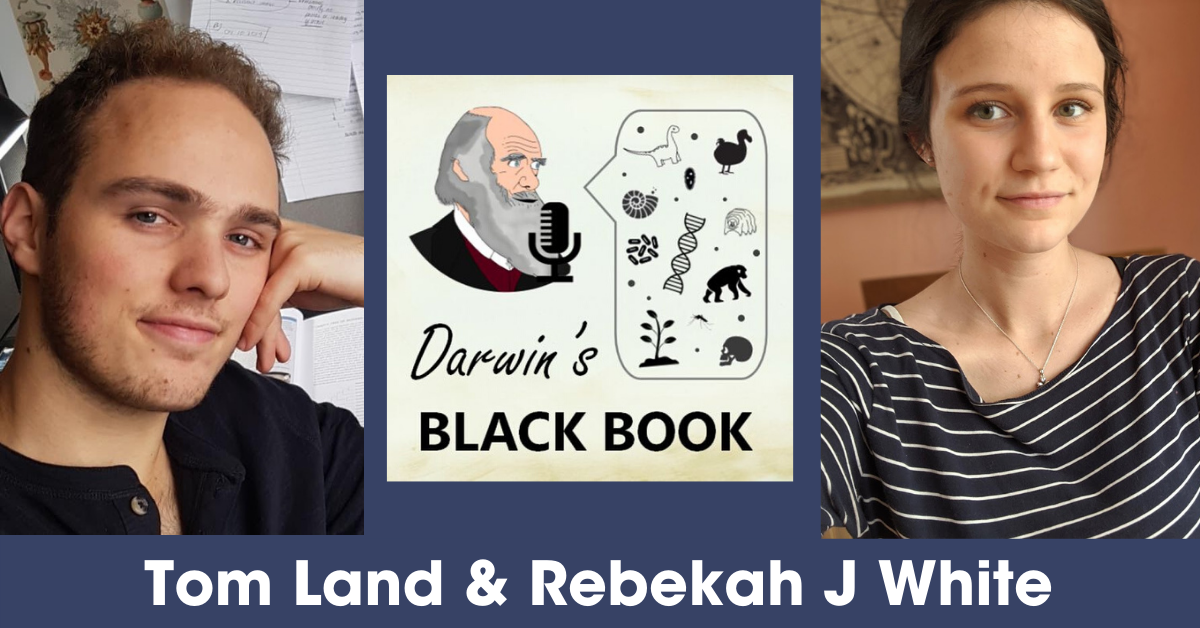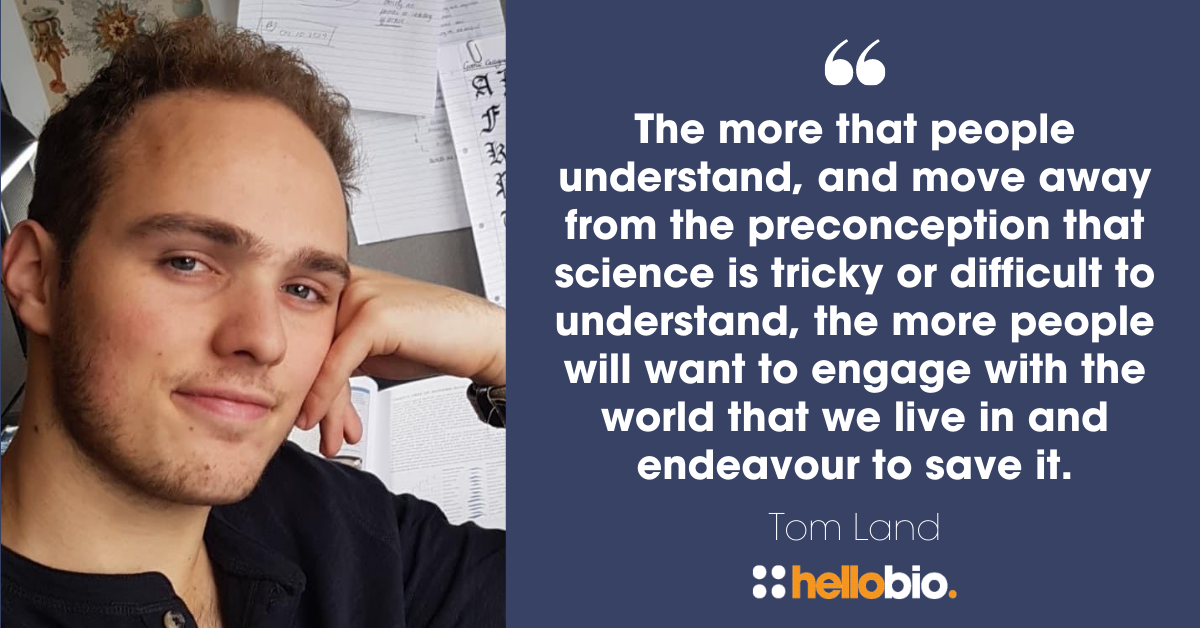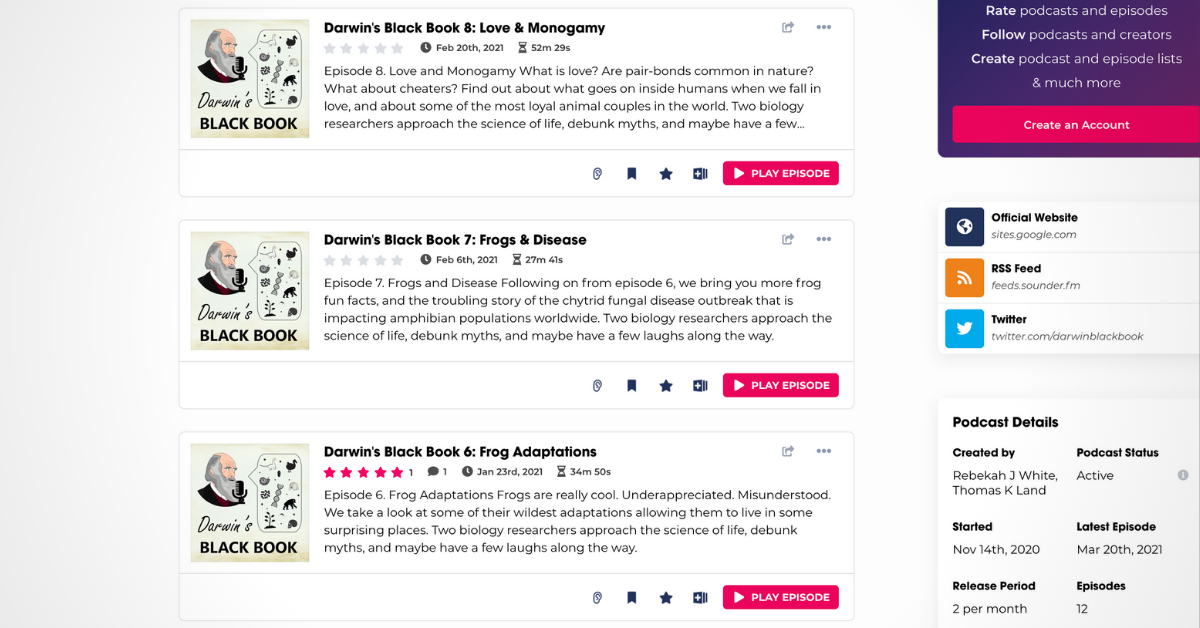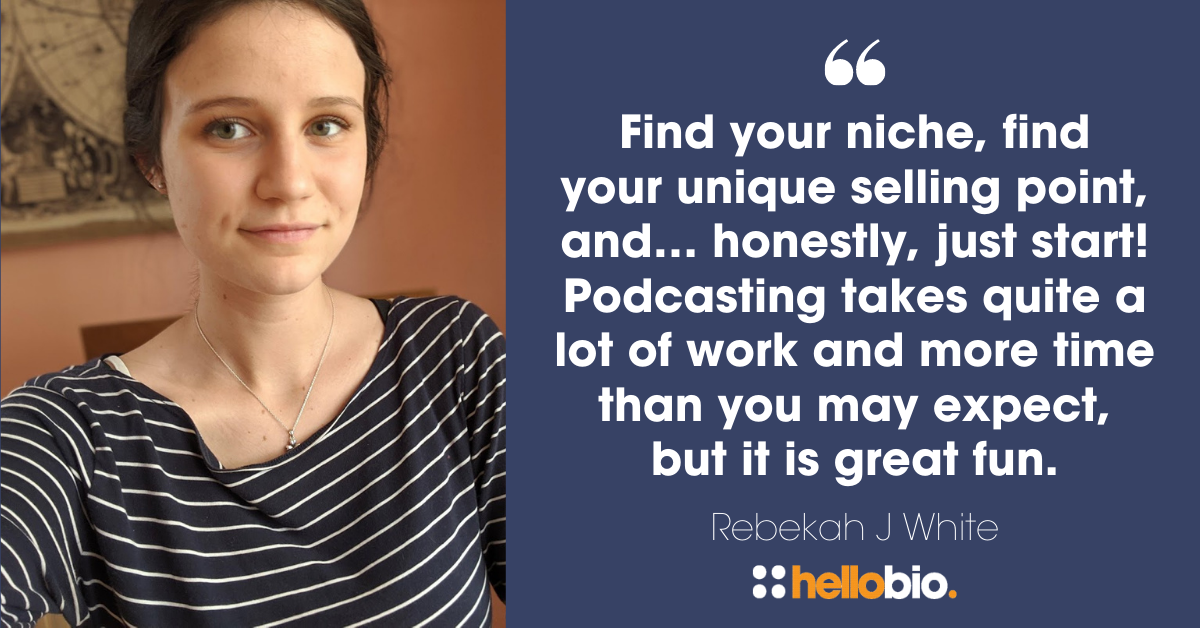Podcasts by Scientists: Darwin's Black Book
In the second in our new Podcasts by Scientists series, we shine the spotlight on Darwin's Black Book! Created by PhD student Rebekah J White and zoologist Tom Land, this brilliant science podcast aims to make the subject of evolution more accessible, debunk myths, and provide a few laughs along the way!
We spoke to Rebekah and Tom to find out more about the podcast and how it came about.
First of all, can you tell us a little bit about your background as scientists?
Rebekah: I am currently an evolutionary biology PhD student at the University of Exeter, looking at the evolution and genetics of late-life disease, lifespan, and ageing in nematodes. My previous projects have been on zoonotic disease emergence and the evolution of contagious cancers in Tasmanian devils, both at the University of Southampton. I guess you could say I always end up back with the evolution of disease in one way or another, but really, I love all types of nature, natural history, and biology!
Tom: I studied zoology and then an Evolution masters at the University of Southampton as well. I seem to be one of those people who can never quite make up their mind which part of nature they want to specialise in, but I have managed to work out what I like best through research. Specifically my career as a scientist allowed me to research behaviour and brain evolution in both dinosaurs and primates, rooted around my immense interest in the evolution of intelligence. However I have moved away from academia to a life of professional research in natural history filmmaking, so I get to cover many topics of biology, scratching that itch that won’t let me focus on just one specialisation.
How did the podcast come about?
Rebekah: Picture Christmas 2019. Tom and I were each at our parent’s houses for the holiday season. I had been listening to more and more podcasts, as well as chatting to my family about science quite lot. I wanted to find a fun evolutionary biology podcast to listen to, but there didn’t seem to be one around! Given that Tom and I both have different areas of ‘expertise’ within evolutionary biology (Tom with zoology, and myself with theories/genetics), and both have a huge passion for the subject generally, I figured we were in quite a good position to start one ourselves. I texted him: “Tom, I have had a vision.” He loved the idea, and when lockdown hit in March 2020, we decided it would be a good time to start. Thanks to funding from the British Ecological Society, we were able to get some nice microphones and introduction music, allowing us to start recording at the start of summer.
Tom: It really was one of those cases where we were thinking very similar things at the same time. It was genuinely a little confusing to see so much content being made for podcasts, but none that covered evolution, and natural history. Plus we both like to talk about science…quite a lot.
Is this the first podcast you have produced?
Rebekah: I have done quite a bit of video editing before, but in terms of podcasting - yes, I had zero experience before we started! I have definitely improved a lot since the first few episodes, and I am increasingly pleased with the results.
Tom: I have had experience putting together a conversational science podcast before, as well as researching and presenting a natural history radio show a few years ago, so in terms of being able to compile bits very quickly to talk about in an episode, I was familiar with it. In terms of the editing and post production side, that was really quite new to me but I think with the input that we both have on that side of things we have found “our sound” and what we want it to be.
Who is the podcast aimed at?
Rebekah: Roughly from GCSE-level biology, all the way up to experts. I know bioscience postdoctoral fellows that enjoy listening, undergraduates who want to learn more about the field they are considering going in to, and adults who have not done any science since they were teenagers.
Tom: Literally anyone who has ever looked at some living organism; from trees to tardigrades, and asked themselves “How on Earth did that turn up?”.
Why is it important to you to make the subject of evolution accessible to wider audiences?
Rebekah: I believe that so many people who think science is ‘too hard to understand’ or ‘boring’ just have not had it explained to them properly or have had the cool bits missed out. Science communication is becoming increasingly important, so it is those people I want to reach the most.
Tom: I agree... and I think the more that people understand, and move away from the preconception that science is tricky or difficult to understand, the more people will want to engage with the world that we live in and endeavour to save it. Now, more than ever, it is absolutely important that we need to understand what is going on, and just to inspire a single person to go and research something further, or go and sit and stare at the bees for a bit, I'll feel I have done the job I set out to do.
What are some of the most common misconceptions about evolution?
Rebekah: Humans evolved from monkeys. Not at all – we share a relatively recent common ancestor with chimps. From around about 7 million years ago.
Tom: The thing that gets me, and it is quite a small thing, but when Evolution is deemed as less than acceptable because it is “just a theory”. Yes it is a theory, but so is gravity. A theory, in the strictest scientific terms, is when a hypothesis is formed, researched and worked at, through the Scientific Method. This is not a half-baked idea, this is not something that was thought up while Charles Darwin was in the shower, this is a conclusion to a long line of research that holds out to every test that is thrown against it (in this case for the last 150 years), and encapsulates what is current knowledge in the scientific community and is an exceptionally worthy title to have.
Which has been your favourite episode so far?
Rebekah: I loved making the frog episodes, which were 6 and 7 – that was originally supposed to be a single episode, but we found we had so much to say about them! And who doesn’t love frogs? We have also had some great feedback for episode 9, Tasmanian tigers, which was great fun too.
Tom: I actually really loved making the episode on Maria Merian (ep. 10). It was fascinating to research into someone so instrumental in entomology, parasitology and natural history art (and who is hardly known), as well as how the people of the 17th & 18th century perceived biology and evolution.
What topics do you have planned for future episodes?
Rebekah: We have a live show coming up in July at the Research Ethics Conference, where we will be taking about the history of biology research’s tricky history with ethics. I’m also pretty excited for our upcoming episodes on the black plague, deep sea, and pollinators! Our Q&A episode is in the works, too, where we answer questions people have sent in, by doing a little research/digging to find the answers.
Tom: I very much want to get into an animal intelligence episode, but I know it's going to be a long one. Also Quantum Biology, something which has captured my imagination since I first heard about it.
What are your plans for the podcast long-term?
Rebekah: Later this year we are launching our fundraiser for the Galapagos Conservation Trust, and hopefully getting some merchandise out. We have reached about 300 independent listeners since we started in November and would love to see it grow to reach even more people!
Tom: I think as long as people are listening, we will keep doing this. If they stop listening, we should probably just be shouting louder. In terms of where I see it going, I hope it can reach a wider audience. We started this to fill a niche in the science communication world, with no clear target of how many people we wanted to reach, which allows us to take opportunities as they come and to really enjoy the journey of getting the science out there. It has been a fantastic thing to be part of and I can’t wait to see where it goes.
What advice would you give to other scientists who are keen to get into podcasting?
Rebekah: Find your niche, find your unique selling point, and… honestly, just start! We have recently had a chat with someone who was hoping to start up their own ecology podcast, so feel free to get in touch if you would like some specific tips on getting started with what you have in mind. It takes quite a lot of work and more time than you may expect, but it is great fun.
Tom: The podcasting world is getting larger and there is a lot out there. Make sure yours is unique, and above all, make something that you would want to listen to.
Aside from Darwin's Black Book, which other science-themed podcasts would you recommend?
Rebekah: I am addicted to Saw Bones, a medical history podcast by Sydnee and Justin McElroy, and I think my podcasting style is influenced a lot by them. I also enjoy Wild Green Streams and Honest Academia!
Tom: The BBC Earth podcast is definitely something to look out for, as well as “Ologies”, which is a great look across a whole swathe of any scientific topic with -ology in its name.
How can our readers listen to your podcast?
You can find us on Spotify or search for us on TuneIn, Spreaker, Sounder, CastBox, Google Podcasts, and Stitcher!
___________________________________________
Connect with Darwin's Black Book:
- Website: bit.ly/darwinsblackbook
- Twitter: @darwinblackbook
- Facebook: @darwinsblackbook
- Instagram: @darwinsblackbook
Connect with Rebekah:
- Website: www.rebekahjwhite.co.uk
- Twitter: @rebekah_jwhite
- Instagram: @bio_bex
Connect with Tom:
- Website: www.thomasland.co.uk
- Youtube: Tom Land- Zoologist
- Twitter: @Tom_K_Land
- Instagram: @travellling_tom_l
___________________________________________
If you enjoyed this article, why not check out the other resources available on our blog. We are passionate about supporting life scientists, early career life scientists and PhD students - with really low- priced reagents and biochemicals, early career scientist grants, and resources to help with both personal and professional development. We know how tough it is - so we hope you find these helpful!
Advice & guidance for life scientists
Click below to view our essential guides and articles to support life scientists, PhD students & early career life scientists:
Wellbeing for scientists
Click below for our resources to help improve your wellbeing:
Technical resources
Try our Molarity Calculator: a quick and easy way to calculate the mass, volume or concentration required for making a solution.
Try our Dilution Calculator: an easy way to work out how to dilute stock solutions of known concentrations
And - when you get to the stage of planning your experiments, don't forget that we offer a range of agonists, antagonists, inhibitors, activators, antibodies and fluorescent tools at up to half the price of other suppliers - click below to see how we compare with other suppliers:























